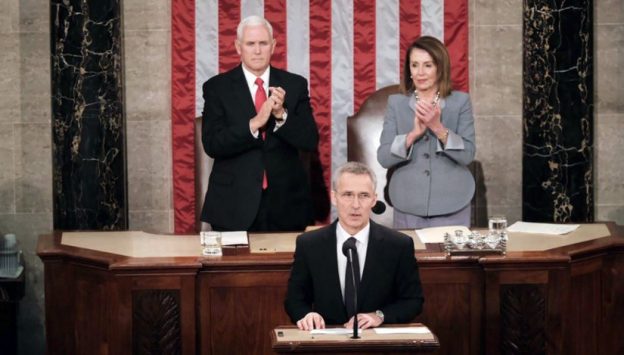The NATO alliance has reached a major milestone—its 70th anniversary. The Washington Treaty, which established the alliance, was signed April 4, 1949. It has succeeded in its primary mission of protecting Europe from first the Soviet Union and the aggressiveness of Vladimir Putin’s Russia.
The North Atlantic Treaty Organization not only is the longest-lived alliance in history, but also is the most successful, NATO Secretary General Jens Stoltenberg (who will remain in the position until 2022) told a joint session of Congress on April 3.
Describing the current threat, Stoltenberg noted that Russia and China are major competitors. “For the first time, we have combat-ready troops deployed in the east of our alliance,” he said. “We have increased the readiness of our forces, tripled the size of the NATO Response Force, modernized our command structure, bolstered our cyber defenses, and we have stepped up support for our close partners, Georgia and Ukraine, sovereign nations with the sovereign right to choose their own path.”
Speaking at a press conference in March, Stoltenberg said “Russia violates the INF Treaty by deploying new nuclear capable missiles in Europe. And we will also address the aggressive actions of Russia in the Black Sea region.”
He stressed that the fight against terrorism is a long-term effort. He also emphasized the growing threat of cyber attacks.
He summarized NATO’s 2018 accomplishments:
- We strengthened our deterrence and defence, including with a new Readiness Initiative.
- We agreed a major update of the NATO Command Structure, with two new commands – one for the Atlantic and another to support military mobility in Europe.
- We carried out Trident Juncture 2018, NATO’s largest exercise in a generation.
- We boosted our cyber defences, including with a Cyberspace Operations Centre.
- We stood united in calling out Russia for its use of a nerve agent on British soil and its breach of the INF Treaty.
- We stepped up in the fight against terrorism, with a new training mission in Iraq, and more support for Afghanistan.
- We deepened our partnerships, from Ukraine and Georgia to Jordan and Tunisia.
- We worked more closely than ever before with the European Union, including on maritime security and military mobility.
- We invited North Macedonia to become a member of the Alliance, showing that NATO’s door remains open.
- We completed the move to this new headquarters, a modern home for a modern Alliance.
The most controversial issue facing the Alliance remains the level of funding. Some nations with strong economies, Germany being the most notable, have failed to contribute their fair share. In essence, the American taxpayer has been paying for the defense of some nations who could well afford to contribute equally. President Trump has frequently addressed the issue.
Stoltenberg has noted that “… all NATO Allies made a pledge to invest more in defence, to improve burden-sharing in our Alliance. And and I expect all Allies, including Germany of course, to make good on the pledge we made together. We didn’t make this pledge to please the United States, we made it because we live in a more unpredictable and more uncertain world. Allies reduced defence spending after the end of the Cold War when tensions went down, but now tensions are going up again and we have to invest more in defence.
“Germany as all other Allies are now making progress. The good news is that after years of cutting defence spending, Germany and all other Allies are adding billions to their defence budgets. So I welcome the progress we have seen, increased investments from Germany, but of course I expect more from all Allies.
“Then, let me add that burden sharing is not only about spending. Burden sharing is also about contributions to different NATO missions and operations. Germany is a lead nation in Afghanistan, has been there for many years. Germany leads one of our battlegroups in the eastern part of the Alliance, in Lithuania. And Germany is also now responsible for our high-readiness force in NATO, and Germany is also leading the NATO activity in the Aegean Sea.”
The article concludes tomorrow, with a summary of NATO’s 2018 Annual Report
Photo: NATO Secretary General Jens Stoltenberg speaks to a joint session of the U.S. Congress in advance of the alliance’s 70th anniversary, April 3, 2019. NATO photo
